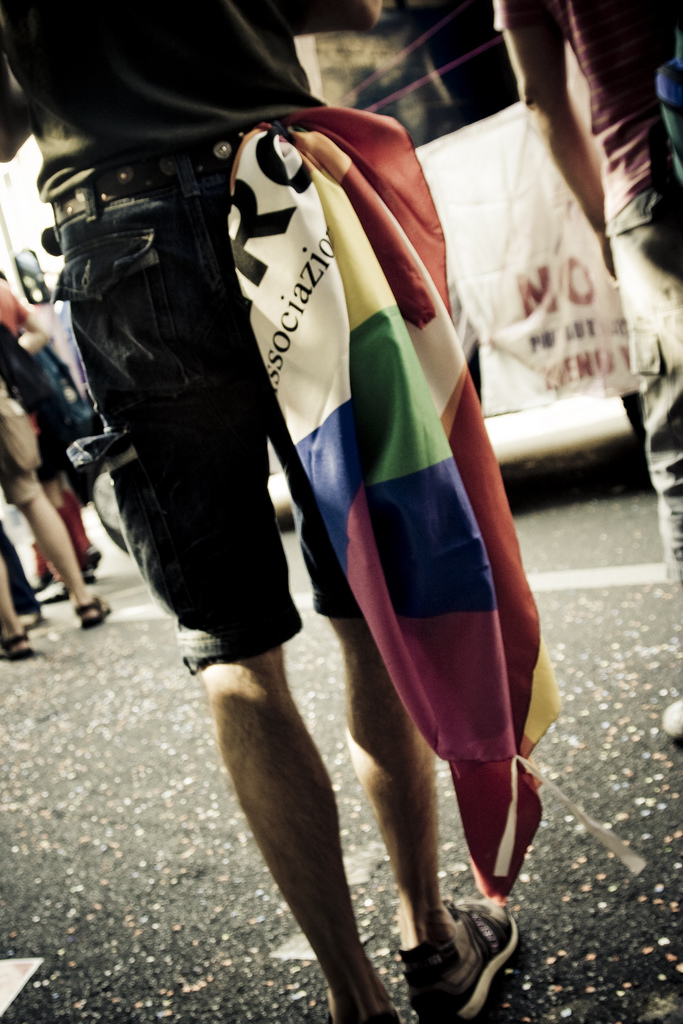Community Picnic Poses Challenge to Manchester Pride
Article published: Thursday, October 29th 2009
Over the August bank holiday many lesbian, gay, bisexual, trans and queer (LGBTQ) activists headed to Manchester for gay pride. However, not all came to enjoy the festival, some came to confront what they see as a corporate, anti-political and business-driven machine.
 During the weekend, an LGBTQ collective ran an alternative Pride picnic in central Manchester, just a few hundred yards from the barriers erected around the Village keeping non-ticket holders out. The group, Reclaim the Scene, are lobbying for Pride to be free and LGBTQ rights to be at the top of the agenda. The picnic, which took place at the University of Manchester Students’ Union on Sackville Street, was designed to provide a free, fun alternative to the mainstream event. Food donated from local allotments, performers and speakers, stalls, and both alcohol-fuelled and alcohol-free spaces were all provided to show Manchester Pride that it is possible to celebrate without charging entry fees or erecting fences.
During the weekend, an LGBTQ collective ran an alternative Pride picnic in central Manchester, just a few hundred yards from the barriers erected around the Village keeping non-ticket holders out. The group, Reclaim the Scene, are lobbying for Pride to be free and LGBTQ rights to be at the top of the agenda. The picnic, which took place at the University of Manchester Students’ Union on Sackville Street, was designed to provide a free, fun alternative to the mainstream event. Food donated from local allotments, performers and speakers, stalls, and both alcohol-fuelled and alcohol-free spaces were all provided to show Manchester Pride that it is possible to celebrate without charging entry fees or erecting fences.
Manchester Pride, the company that organises the city’s official event, has courted controversy since the introduction of a pay-for-entry system in the late 1990s. They have faced accusations that Pride has become merely a money-making business, as those who can’t afford the £17.50 wristbands are excluded from the Village for the Big Weekend festival. Manchester Pride is now inaccessible for groups of LGBTQ people including the homeless, the unemployed, the low-waged and many parents, as even children pay £5 per day.
Pride organisers cite security issues and volunteers expenses as justifying a charge and claim that all profits go to charity. But in 2007 only 12 per cent of money raised by Pride went to LGBTQ charities. The Charity Commission investigated and concluded that Manchester Pride had not organised “charitable fundraising events” and removed their charitable status. In 2008 Phil Burke, Chair of the Village Business Association, resigned from the Board of Manchester Pride stating that it was “run by dictators” and “just about making money”. Activists wait with interest to discover the destination of money raised by this year’s event.
Organisers are also accused of diluting the politics of Pride, censoring the National Union of Students’ Parade entry last year by warning student protesters to remove placards claiming ‘Pride is a Protest’ or ‘Stonewall was a Riot’. While organisers no longer regard the Parade as an appropriate forum for highlighting LGBTQ inequality, groups including the National Front and Christian Voice shout hate and discrimination from the sidelines with impunity.
This year, however, the National Union of Students were allowed an overtly political entry and the Parade was headed by a Community Float designed so that anyone could march. Events leading up to the Big Weekend were more diverse and heavily publicised, suggesting that Manchester Pride is changing its attitude. But some groups insist it still isn’t good enough.
“As the parade ends each year people who have had the courage to come out and march reach the end of the route to be greeted with barricades,” explains David Henry from the Queer Youth Network. “For us, that’s where Pride finishes. It’s like we’re being told to get back in the closet”.
Salford-based LGBQ activist Alan Bailey goes further. “Manchester Pride PLC is letting us down and we need to let them know that Pride is a protest,” he says. “Lesbian, gay, bisexual, trans, queer people don’t have liberation. Despite some legal victories, the 40-year-old ‘gay rights movement’ must still fight for free love, free gender expression and a radical alternative to an exclusive society.”
Reclaim the Scene is just one of many groups to have openly challenged Manchester Pride and run alternative Pride events in recent years. Event volunteer Emma Kerry explained that Reclaim the Scene sets a worthy example. “Manchester Pride organisers would do well to take a step back. The pink pound and set body ideals are not what LGBTQ people want because they can see the homophobia still facing them in the world. Manchester Pride should be free, accessible and community based,” she says.
To find out more see: www.ReclaimTheScene.com
Jennie O’Hara is a Manchester-based queer activist and co-founding member of Reclaim the Scene
More: Manchester
Comments
No comments found
The comments are closed.



